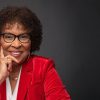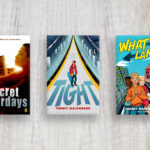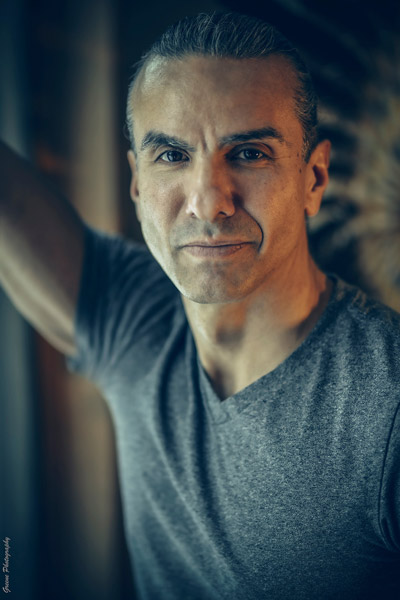
Anton Treuer’s new book, the Young Readers Edition of Everything You Wanted to Know About Indians But Were Afraid to Ask, will be published April 6th. This pair of quotes from the book make a compelling argument for why it belongs in every middle and high school in the country:
Here, Treuer talks with Lisa Bullard about asking and answering the hard questions, creating a Young Readers Edition of his book, and delivering visibility and validation to all children, regardless of their background.
Although you’re the author of nineteen books, this is your first title for young adults, so many Mackin readers may not yet be familiar with your work. Could you share a biographical note?
I am so honored to enter the young reader space with Everything You Wanted to Know About Indians But Were Afraid to Ask. I am a lifelong educator and racial equity advocate, a cultural servant in my Native community, where I officiate at life ceremonies and funerals, a teacher of and advocate for Indigenous language revitalization, and a father of nine amazing children. All of these activities intersect around making the world a healthier, safer, and more vibrant place for young people. Writing to and for young readers is exactly where I need to be now.
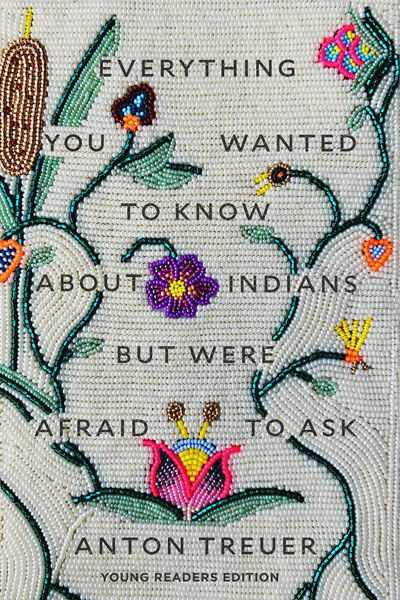
You cover hundreds of questions in the book, drawn from your own experiences and from making presentations all over the U.S. and internationally. What would you say is the question you’re asked the most often?
It all depends on whom I am talking to. I do a lot of work with middle and high schoolers and they are fascinated with Indigenous cultures and often have a lot of questions about that. But young readers really want to change the world, too, and they have a lot of questions about hot-button current topics like mascots, pipeline protests, social activism, and race. Adults and kids alike want to know how they can make a difference. Most of us got a sugarcoated version of Columbus and the first Thanksgiving, so lots of people want some history lessons and perspectives. People want to get good information and know that with Native Americans, it’s sometimes harder to get since we are so often imagined and so infrequently well understood. I think terminology and mascots get the most queries by adults. I think culture and social activism get more questions from young people.
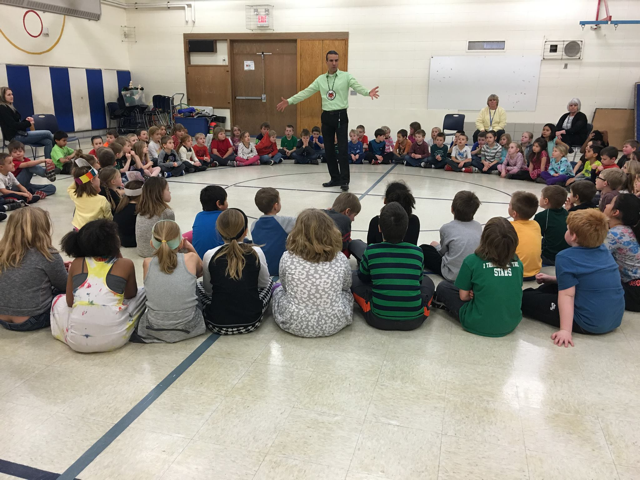
Anton Treuer at Carleton Public School in 2018, Ojibwe Storytelling
In your experience, what’s the question that most people are afraid or embarrassed to ask?
Sometimes people are nervous to ask about cultural appropriation because they want to engage Native people and don’t really know how—there is a lot of fear of offending someone or exposing an ignorance.
Anton Treuer Talks About How Educators Can Help to “Make and Be the Change”
Our educational system is in crisis. Only 60% of our students of color finish high school. Only 50% of Indigenous students finish high school. But 51% of America’s K-12 students are students of color, and that number is not going down. If we had racial equity today (we don’t, but pretend we did), our educational system alone would engineer racially predictable financial disparities because of the link between educational attainment and financial prosperity. We have to understand and address what drives these disparities. There is a lot in the book on that, and it is worth the time for teachers, administrators, and kids to engage with it. Together we can make and be the change.
The original edition of this book, targeting adult readers, was published in 2012. You’ve added material to bring the Young Readers Edition up-to-the-moment. What has changed in this new edition?
Twenty percent of the fluent speakers of tribal languages in Minnesota died during the COVID epidemic. It has been heartbreaking and horrible. So, I talked about the impact, why the pandemic has affected Natives differently, and also how we have adapted—doing language revitalization work over Zoom, developing Rosetta Stone applications for tribal languages, and many other positive innovations. That’s all part of the Native experience. I added a lot more on social activism, new history sections, more material on politics, and new cultural information. It was nice to fill gaps from the first edition, but also to speak directly to young readers—our future leaders—who are full of hope and honest inquiry.
“Twenty percent of the fluent speakers of tribal languages in Minnesota died during the COVID epidemic.”
What has changed the most from the first edition of the book to this one?
From the adult edition to the current one, I added a lot of information on social activism—Dakota Access Pipeline Protest, the confrontation at the Lincoln Memorial, and many other things happened in the years between these two books. But my own thinking about taking action and framing race and gender advocacy has grown too and is reflected in the new edition.
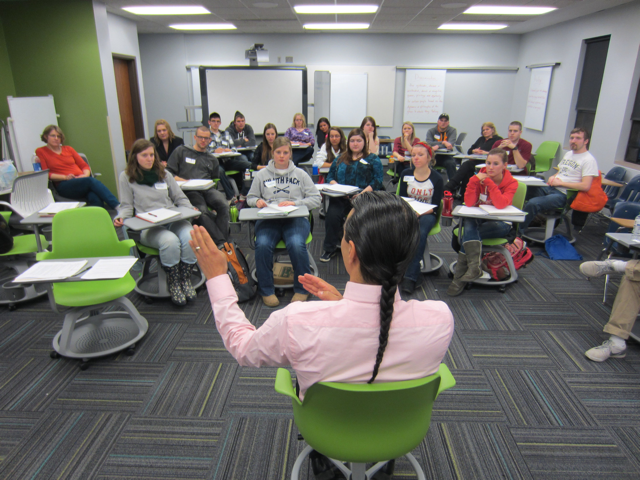
Anton Treuer teaching at Bemidji University, 2018
You invite young readers to challenge misperceptions and to dig into historical and contemporary realities while also providing perspective and practical advice about changing things for the future. How did you maintain your overall hopeful tone despite tackling so many tough topics?
We are more than the sum of our tragedies. Indigenous people have inherited historical trauma, but we have inherited historical resilience too. I have always been filled with hope. Taking an honest look at history and current inequity doesn’t have to be about beating each other up or seeing the world as a dark place. Shining some light on the darkness helps us navigate forward and find the best versions of ourselves to do that. That’s a great individual endeavor, but it’s even more powerful when done collectively. That’s where great music, great art, or a great book can help us transcend our differences and find collective purpose and action.
“Taking an honest look at history and current inequity doesn’t have to be about beating each other up or seeing the world as a dark place. Shining some light on the darkness helps us navigate forward and find the best versions of ourselves to do that.”
How life-changing is it for a young person to be told the whole truth about something, even if it’s a difficult or complicated truth?
I went to school K-12 in typical American public schools. I think my educators wanted the best for me. They weren’t trying to marginalize me, for example. But the system didn’t expect them to teach me about me. Maybe many of them were afraid to share about Native content because they didn’t know any. But the result was the same. I spent thirteen years in school, supposedly learning everything I needed to know to be successful in the world, but none of it had anything to do with me. The message delivered by the absent narratives was that me and mine were not important, not relevant, and didn’t matter. That’s the damage caused by absent narratives. But when I first started learning about my own history, language, and culture, it lit me on fire and inspired a lifetime of community service, educational achievement, and connection with all kinds of people. That’s the power of accurate information, visibility, and validation. We all need that. And we can all contribute to delivering that to all of our children regardless of their background.
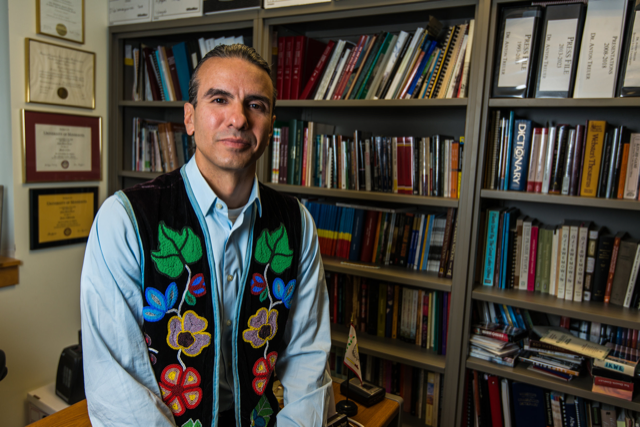
Courtesy of Anton Treuer
“I spent thirteen years in school, supposedly learning everything I needed to know to be successful in the world, but none of it had anything to do with me. The message delivered by the absent narratives was that me and mine were not important, not relevant, and didn’t matter. That’s the damage caused by absent narratives.”
Did writing a book for young people have a special significance for you because of your roles as both an educator and a parent?
Yes. I want my children to have great opportunities to lead long, healthy, happy lives. Their positive identity development contributes to that. It really does take a village to raise a child. The teachers, librarians, students, and citizens who interact with my kids are their village. I want them to know about Indigenous people. And I want my Indigenous kids to know about the world. As an educator myself, I try to connect my students to information, shape their learning environment, develop their critical thinking, and support their self-stated goals. What could be more important than that?
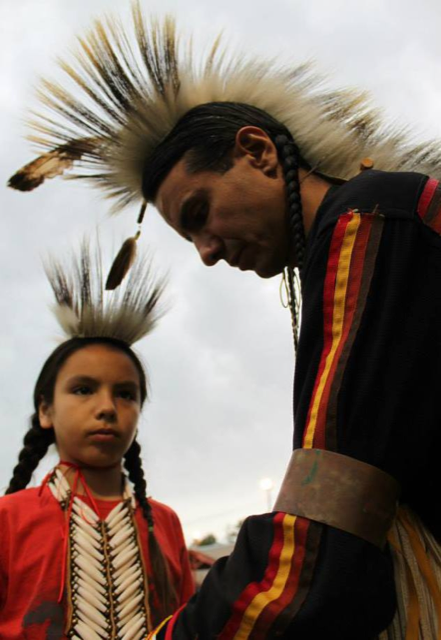
Courtesy of Anton Treuer
In addition to your book, where else can classroom teachers and librarians find accurate and contemporary sources of information about Indians and Indigenous people to share with their students and communities?
I have a section in the book on recommended reading. There is a lot of new material being published all the time. There are also a lot of great TED talks and free material online that’s genuinely useful. There are conferences and community conversations happening all the time. Hundreds of my presentations have been archived on YouTube for free and my website lists upcoming presentations. Keep looking for answers and advocating for change and understanding.
Are you interested in having classrooms or communities generate their own questions to send to you for Everything You Wanted to Know: The Sequel?
I have a file full of questions. Send me any that you have. I used the ones generated from the first publication of this book to develop the Young Reader Edition. My website and email are below—please be and stay in touch.
Connect With Anton Treuer
Is there anything else you’d like to add?
Learning about Natives is an act of charity for Natives. All of us humans have been deeply impacted by colonization. Colonization is violence—supplanting cultures with another. The violence dehumanizes and hurts all of us—including those who win the wars and those who win the culture wars. But it doesn’t have to be this way. Native people have more than vestigial remnants of very different ways of solving problems. We can and should pollinate the garden everyone is trying to harvest from. Since we have all been dehumanized by colonization and racial caste, we all need healing. Leaning in is not an act of charity for the marginalized—it is a critical effort to heal and liberate all of us humans.
“Leaning in is not an act of charity for the marginalized—it is a critical effort to heal and liberate all of us humans.”
Anton Treuer Reflects On the Importance of Pushing Past the Discomfort of Having Tough Conversations
We all have a part to play in making this world a better place. When we go the gym it’s not always comfortable, but it can make us stronger. I encourage everyone to lean in. We don’t expect parenting to be comfortable. We know there will be fevers and short nights. But because we don’t expect the parenting job to be comfortable, parenting can be beautiful and uplifting and desirable. Why do we expect racial reconciliation or national healing to be comfortable? We can love peace and justice like we love our kids and expect some discomfort as we seek to do our part to nurture them. For educators and librarians, if we know enough to know that we don’t know something, then it’s time to lean in—read a book, share it with young people, talk about tough topics, and make the world we want to live in.



